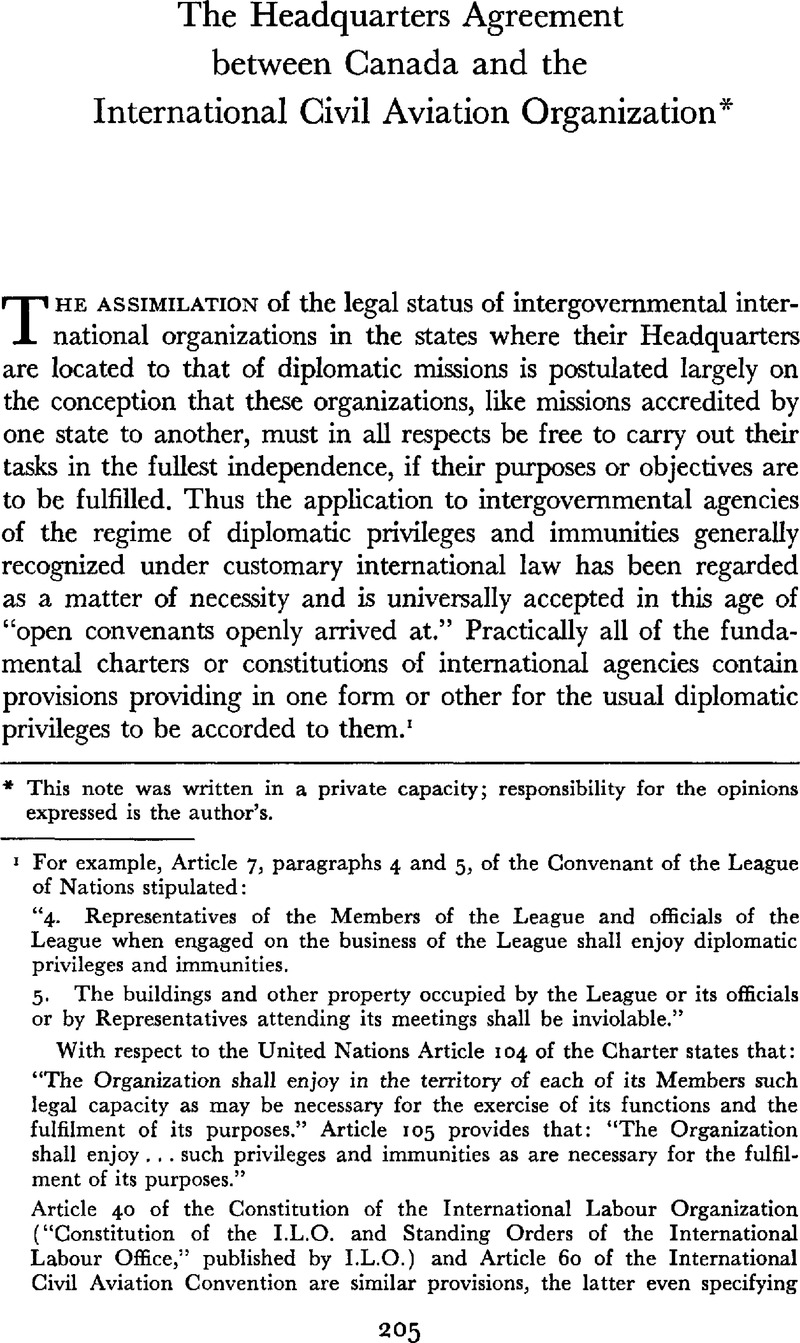Article contents
The Headquarters Agreement between Canada and the International Civil Aviation Organization*
Published online by Cambridge University Press: 09 March 2016
Abstract

- Type
- Notes and Comments
- Information
- Canadian Yearbook of International Law/Annuaire canadien de droit international , Volume 2 , 1964 , pp. 205 - 214
- Copyright
- Copyright © The Canadian Council on International Law / Conseil Canadien de Droit International, representing the Board of Editors, Canadian Yearbook of International Law / Comité de Rédaction, Annuaire Canadien de Droit International 1964
Footnotes
This note was written in a private capacity; responsibility for the opinions expressed is the author's.
References
1 For example, Article 7, paragraphs 4 and 5, of the Convenant of the League of Nations stipulated:
“4. Representatives of the Members of the League and officials of the League when engaged on the business of the League shall enjoy diplomatic privileges and immunities.
5. The buildings and other property occupied by the League or its officials or by Representatives attending its meetings shall be inviolable.”
With respect to the United Nations Article 104 of the Charter states that:
“The Organization shall enjoy in the territory of each of its Members such legal capacity as may be necessary for the exercise of its functions and the fulfilment of its purposes.” Article 105 provides that: “The Organization shall enjoy … such privileges and immunities as are necessary for the fulfilment of its purposes.”
Article 40 of the Constitution of the International Labour Organization (“Constitution of the I.L.O. and Standing Orders of the International Labour Office,” published by I.L.O.) and Article 60 of the International Civil Aviation Convention are similar provisions, the latter even specifying that the President of the Council, the Secretary General, and other personnel of the Organization, are to be accorded “diplomatic privileges and immunities which are given to the corresponding personnel of other public international organizations.”
2 The votes were: for Canada, 27 votes; France, 9 votes; Switzerland, 4 votes; and China, 1 vote. See Minutes of the Interim Assembly, A/41 5/6/46.
3 On April 4, 1947.
4 For text of this Convention, see Schedule to Privileges and Immunities (United Nations) Act, R.S.C. 1952, c. 219.
5 See letter from Dr. Edward Warner to Mr. Lester B. Pearson, Doc. 3120 C/391, 15/8/47, at 287–300.
6 See Rt. Hon. Louis S. Saint-Laurent’s letter to Dr. E. Warner, dated April 30, 1947, ibid., 301–305 and A1-P3, 1/4/47.
7 See Doc. 7310 — C/846, at 40–42.
8 Doc. 7310 — C/846, at 40–1.
9 Doc. 7313 — C/848, at 25.
10 Agreement between the International Civil Aviation Organization and the Government of Canada regarding the Headquarters of the Organization, (1951) 96 U.N.T.S. 155. See, also, Privileges and Immunities (United Nations) Act, R.S.C. 1952, c. 219, and Order in Council P.C. 1954–1791, Nov. 18, 1954, Statutory Orders and Regulations, Vol. III, at 2589.
11 Under Article II of the Agreement, ICAO undertook to “prevent the Headquarters premises from becoming a refuge either for persons who are avoiding arrest or for persons who are endeavouring to avoid service or execution of legal process.” Thus the so-called right of asylum is explicitly excluded from the Franchise du quartier.
12 Items in paragraphs (a), (b), (c), (d), and (e) are applicable to all international (non-Canadian) officials of the Secretariat, irrespective of ranks or grades.
13 The Order in Council (P.C. 1791 of November 18, 1954) also states: “Nothing in this Order shall be construed as exempting a Canadian citizen residing or ordinarily resident in Canada, from liability for any taxes or duties imposed by any law in Canada.” (United Nations ST/LEG/SER.B/11, Vol. 2, at 22).
14 See Article III, Section 14 and Article IV, Section 25.
15 Resolution A9–9.
16 See A10-WP/8 EX/6 and Addenda 1, 2 and 3.
17 With respect to the question of income tax for members of the Secretariat who are Canadian citizens, the federal government, according to a declaration by the Chief Delegate of Canada at the Tenth Assembly ICAO, “while not surrendering the right to tax Canadian nationals, found a means of foregoing federal income tax for the Canadian staff in their salaries from ICAO.” (A10-WP/150 Min. EX-13, at 107). As to provincial income tax for which the government of Quebec was reluctant to grant relief, the federal government also agreed to reimburse ICAO for the greater part of any payments that the Organization might make to its Canadian staff to defray their provincial income tax. (Doc. 7788 A11-P/1, at 53; see also, Doc. 8317 A15-P/1, at 94.)
18 See A10-WP/8 EX/6, at 3.
19 As an alternative to the present rental arrangement, the Canadian government has taken the initiative to suggest that ICAO consider the possibility of erecting its own Headquarters building, and expressed its willingness to make available to the Organization an interest-free loan to be amortized over a long period. The suggestion has been under study but no final action has yet been taken.
20 See A10-WP/150 Min. EX-13, 15/8/56, at 107.
21 Resolution A14-53, Doc. 8268 A14-P/20, at 90–91; and Doc. 8331–13 C/94313, at 182.
22 Resolution A10-10, Doc. 7707 A10-P/16, at 27.
- 1
- Cited by


